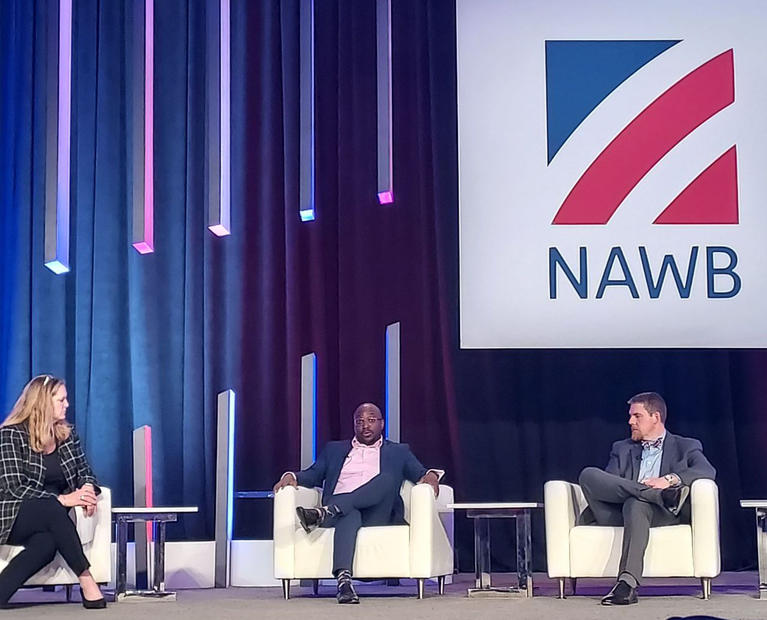
More than 1,300 passionate and dedicated workforce leaders gathered in Washington, D.C., March 23 - 26 for four full days of knowledge sharing, connecting, and learning at the 2024 National Association Workforce Boards (NAWB) Forum—the nation’s largest annual workforce development gathering and conference.
NAWB Board Chair and Colorado Workforce Development Council Past Chair Lisanne McNew and NAWB President and CEO Brad Turner-Little opened the general session Sunday morning, kicking off the collective journey of navigating the future of work and forging tomorrow’s workforce today.
Five CWDC Council Members, Managing Director Lee Wheeler-Berliner, Assistant Director of System Innovation Renise Walker, and more than 50 local workforce area staff and board members from Colorado were in attendance.
The 2024 Forum featured more than 200 speakers in more than 60 breakout sessions and six general sessions, along with five NAWB Awards presentations. Explore 2024 recap and highlights.
CWDC Managing Director Lee Wheeler-Berliner participated in a panel discussion on “Driving Economic Vitality: Strategies for Equitable Workforce Development,” and discussed how Colorado is navigating the evolving landscape of work, and building strategies for driving inclusive economic growth and social mobility.
"In Colorado, we started down the skills-based hiring road because employers were coming to us struggling to find the talent they needed. My message to employers is if you are treating human talent as a supply chain issue and waiting for the talent to come to you and that is working for you, great keep doing that. But if your talent needs aren't being met, consider treating it as a value chain issue and take the approach of co-developing talent and investing in talent much earlier in the process to get the value you need," said CWDC Managing Director Lee Wheeler-Berliner.
A special Learning Employment Records (LER) Design Lab was held to unite diverse stakeholders from the LER ecosystem to refine and finalize a readiness assessment for local and state workforce development boards. A panel discussion and expert-led breakout sessions helped participants collaboratively inform the evolution of the LER ecosystem roadmap, and identify actionable strategies to enhance user experience and technological infrastructures, align policy, and more.
Assistant Director of Systems Innovation Renise Walker presented as a panelist in the “21st Century Hiring: Skills, Credentials & Data” discussion, sharing how Colorado is leveraging SkillsFWD funding to launch the ColoradoFWD project, an 18-month pilot demonstration working to catalyze an equitable, skills-based ecosystem that uses LERs to address urgent talent shortages in behavioral health and direct care.
ColoradoFWD will build existing efforts in the state to integrate educator licenses in MyColorado as part of Colorado Department of Education’s participation in the National Governors Association’s Skills for the States community of practice focused on skills-based hiring in the public sector.
Walker shared how Colorado is adapting its earn-and-learn ecosystem, and supporting learners and workers within the ever-changing landscape. She also emphasized the role state and local workforce boards can play in the evolution of skills-based practices.
“State and local workforce boards play an important role in plans to increase access, opportunity, and awareness in their communities,” Walker said. “They must work diligently to align education with industry needs, and promote the skills of learners and workers and connect them with opportunity.”
Colorado is at the forefront of workforce innovation, recognizing the importance of intersecting initiatives that address both the needs of the workforce and the broader economic factors that influence economic mobility, job creation, investment, and productivity.
As we forge today’s workforce and future of work, it is critical that learners and workers have more control over their data and can use it to inform education and career decisions. Advancing the ecosystem also requires that we influence higher education and talent development legislation, align policy, connect data across systems, improve job quality, and empower Coloradans by providing more evolved tools—like Learning Employment Records (LERs)—into the ecosystem.